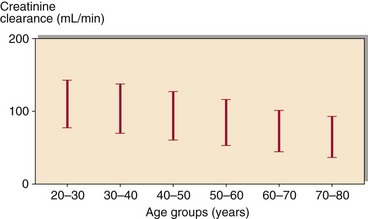74 There is considerable variation in the onset of functional changes in body systems because of age. Many organs show a gradual decline in function even in the absence of diseases; but since there is often considerable functional reserve, there are no clinical consequences. The problem facing the clinical biochemist is how to differentiate between the biochemical and physiological changes that are the consequences of ageing, and those factors that indicate disease is present. Just because the result of a biochemistry test in an elderly patient is different from that in a young person does not mean some pathology is present. Serum creatinine is an example. Renal function deteriorates with age (Fig 74.1) but finding a serum creatinine of 140 µmol/L in an 80-year-old woman should not be cause for alarm. Indeed, this creatinine result may represent a remarkably good glomerular filtration rate considering the age of the patient. The admission of a patient for geriatric assessment involves a degree of ‘screening’ biochemistry that may point towards the presence of disorders that may not be suspected (Table 74.1). Table 74.1 Biochemical assessment in a geriatric patient
Biochemistry in the elderly
Disease in old age
Test
Associated conditions
Potassium
Hypokalaemia
Urea and creatinine
Renal disease
Calcium, phosphate and alkaline phosphatase
Bone disease
Total protein, albumin
Nutritional state
Glucose
Diabetes mellitus
Thyroid function tests
Hypothyroidism
Haematological investigation and faecal occult blood
Blood and bleeding disorders
Biochemistry in the elderly










